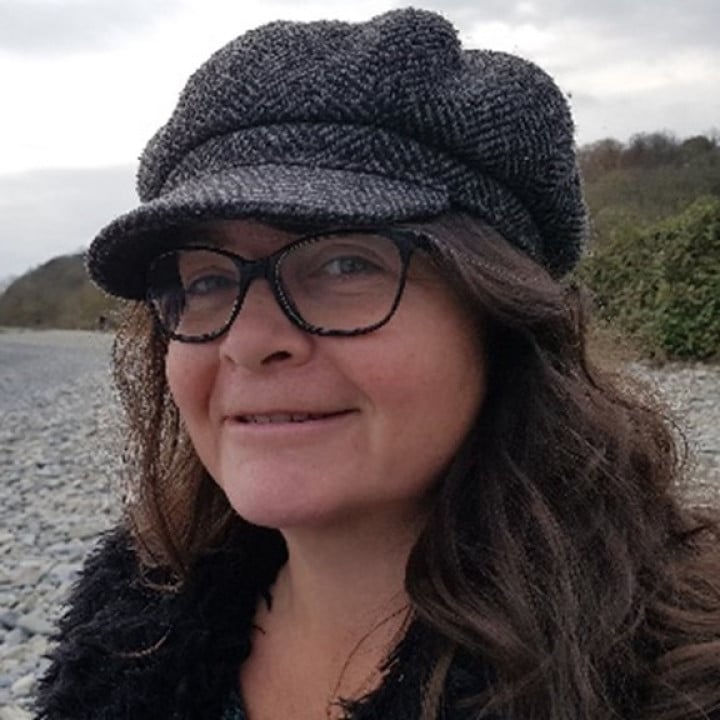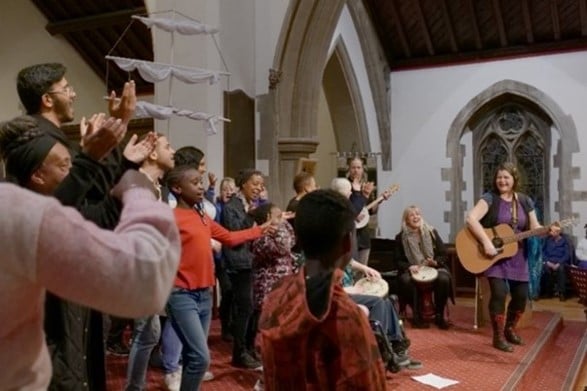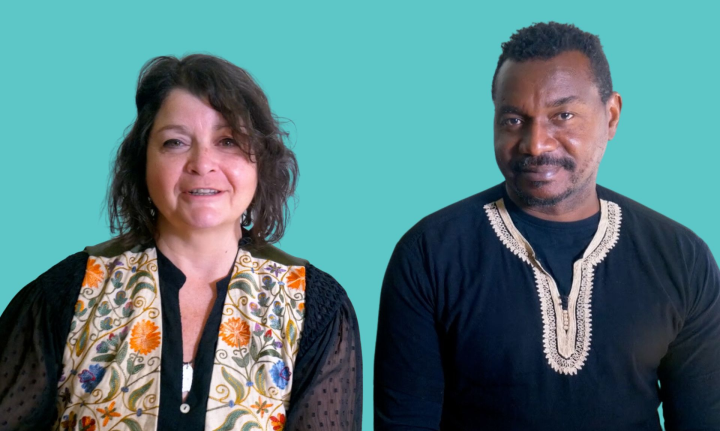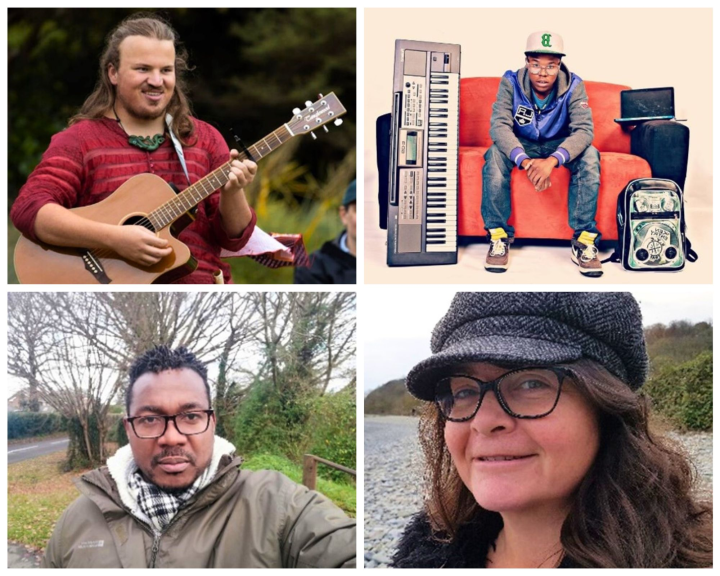
Tell us about yourself
My name is Laura Bradshaw and I’m a community musician and composer based in the seaside town of Barry in south Wales.
How would you describe yourself in 3 words?
Busy, positive, and hopefully innovative.
What is the story behind your song Dreams across the ocean (Away, roll to sea)?
The song aims to convey our connection as members of the human race via the water that freely travels around the globe – reaching some parts far more than others, and to convey that ultimately, we are all connected due to our need for the resource that is water. Lands are connected via the sea. The song encourages us to use our imagination as we ‘Dream across the ocean,’ perhaps seeing things from the different perspective of people from different parts of the world to us. The water flows, allowing our imaginations to flow around the world.
What inspired you to create your song?
The theme of Global Voice is very close to my heart as I work with people who have been displaced from their home countries due to physical danger. The genre I chose was the sea shanty and I have created many songs in that form, so relished the chance to create one for Sing Up Day. It’s a folk form and is approachable with or without any instruments, and also always has catchy and accessible refrains so that people can learn and join in quickly.
Can you tell us something interesting about your songwriting process?
I tend to write in many different ways – I find that sticking to a prescriptive strategy doesn’t always work, so sometimes writing lyrics as a stream of conscience, even nonsensical or first thoughts, then going back to that and making some kind of order from the flow can work… other times the melody or chord structure is found first, with words wiggling into place around that. Sometimes I will choose more abstract ways to work e.g. write a rhyme quickly – without much thought – and then choose the words that most stand out and form a new and more abstract poetic statement out of that. To use someone else’s words or to write words as a group is a different and exciting challenge! I often facilitate the writing of songs within my community music settings. It’s always lots of fun! People could perhaps create their own lead lines to the song as a creative exercise after Sing Up Day as part of their own songwriting projects?
How does your song link to the theme of Global voice for Sing Up Day?
To me, the theme of Global voice means a voice, or a vehicle for voices to be heard in all parts of the world, and particularly to be heard on an equal footing. Dreams across the ocean has set words that convey the journey of water as rain onto our faces, then through the land, down hills into the sea – the sea then is a connecting point between different lands (though some lands are ‘landlocked’) – water will be of interest and hopefully inspire the imaginations of everyone who engages with the song. It’s about recognising and respecting each other – a wave in friendship across soft and hard borders. The addition of the poetic translations of sections of the song by linguist and songwriter Joseff Gnagbo has added a huge amount to the song in terms of its openness to cultures and languages of the Global Majority and other nations with their multitudes of indigenous and common languages. Welsh is an indigenous language, Joseff’s mother tongue is French and he chose the African language of Swahili to represent his birth continent. This leads to another creative challenge – can you create the responses in your own indigenous or birth language? The song also hints at ‘So dream with me of our planet blue, the earth that’s home to me and you… Our journey now is just begun’ encouraging participants and viewers to perhaps see that they have a say and power in the way the future of the earth will be. Starting from right now.
Talk to us about how you collaborated with fellow songwriter Joseff Gnagbo on this project.
I have collaborated with Joseff Gnagbo over recent years – we don’t have a set way of working but on this project, I wrote the song first and then Joseff created beautiful and approachable poetic translations and we have recorded them together as learning guides. Joseff chose to create the translations to the choruses and refrains in his mother tongue French, a chosen language of his African continent Swahili, and his new home language – the indigenous language of Welsh. Joseff is a linguist and also a songwriter and rapper. When I facilitate songwriting within my community projects a method is to invite people’s thoughts first – give time for people to think, ask them to write down their ideas making sure you keep as many notes as possible, if something someone adds feels like it is going to be a key point or hook in your song, then ask if anyone can sing those words. If they do, then ensure to record their singing as a notetaking process to aid memory. Another way is to ask for chord suggestions or create chord sequence you think will work and ask them to sing over the top of your chords. That way as many of the group’s ideas as possible are added in. The facilitator role is to do this but ensure the song is cohesive and satisfactory to sing for all. Also thanking those whose ideas haven’t fitted in completely as they helped the whole group to get to the final version. Even those who don’t contribute ideas are helping by holding the creative atmosphere. Next time they may feel safe enough to offer up their ideas too.
What else should we know about the song as we approach Sing Up Day?
Have a listen to the song before learning it and you will hear the repetitive and catchy sections within the song. This will help you to realise how approachable the song is, particularly within the ‘response’ sections. The full song has a few sections but there’s always a simple way for all to engage with this, for example everyone could sing all of the song… Some – perhaps older children or a particular class could do the lead parts or even perhaps soloists (it could be the teacher or leader). [To explore more of Laura’s suggestions, have a look at the teaching notes for Dreams across the ocean here.]

I worked with the wonderful youth group from one of my community music projects, Oasis One World Choir, to create a video performance of the song, which will hopefully provide some inspiration for you and those around you to create your own performances. We all had a lot of fun on the day we did the filming and we weren’t too precious about everything being too perfect – it is a modern day sea shanty. An authentic sea shanty would have been a work song – it’s purpose being to encourage teamwork and physical effort needed for the operations of a sailing ship. Accuracy of spirit was what was needed! In the video you will see the children singing parts together with some parts as solos, some with movement and body percussion – all just suggestions for you to find your own way of visually or vocally engaging with the song. Hopefully the song will be kept alive with the fun people have with it. In a live performance, the ‘Haul away, oh’ riff is something that an audience could be encouraged to sing along with. As an add on, are two harmony options to the responses for those who would like to sing in harmony parts.
Have you ever had writer’s block while trying to write a song? If so, how did you overcome it?
Songwriting can come quickly but can also be a long, time-consuming process. Taking breaks – asking friends and family if they think certain lines work etc., doing something else creative, or something outdoors to give the brain a rest from the particular task, then you will hopefully come back refreshed.
What advice would you give to someone starting out as a songwriter?
Start to doodle with words and melody – use a voice notes app on a phone if you have one or try to sing what you have created repeatedly until you know you’ll remember it. Trust yourself and don’t be deterred by the judgment of others!
What is one message about global voice that you’d like to share with children and young people across the world?
The world is yours – find happiness and aim to be positive with time for calm within your lives. Learn to put yourselves into the shoes of others around the world and you will for sure be the ones who can do things to change the world for the better for everyone!
What feeling do you hope to evoke from children and young people when they hear your song?
I hope people will start to sing along as they hear the repetitions on first listening. I hope that everyone can have fun with the song and can sing their hearts out, move their bodies, and tap and clap along (or other) whilst engaging with the song.
What was your favourite children’s song when you were younger?
Five little speckled frogs – when I was very small!
Head over to the Dreams across the ocean song page to learn the song, find pronunciation guides, lyric videos and more…
Not signed up for Sing Up Day yet?
Get involved



